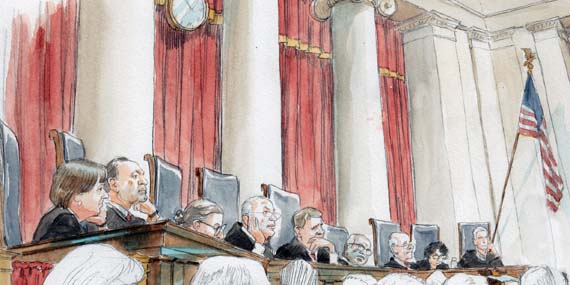Monday round-up

For The Washington Post, Robert Barnes reports that Chief Justice John Roberts has met with criticism for suggesting during the oral argument in partisan-gerrymandering case Gill v. Whitford “that forcing the court to make … decisions” about “when normal politics became unconstitutional bias” “would put the justices in a no-win position and tarnish the reputation that they — he — had worked hard to burnish.” At the Post’s Volokh Conspiracy blog, David Post hopes that the court does not rely on its relative lack of expertise in statistical analysis to “abdicate its responsibility” in Whitford “to craft some meaningful and manageable measures of partisan interference with the electoral process.”
Briefly:
- For The New York Times, Adam Liptak reports on the experience of an Ohio voter whose “occasional decisions not to vote had led election officials to strike his name from the voting rolls,” noting that in Husted v. A. Philip Randolph Institute, “the Supreme Court will hear arguments about whether the officials [went] too far in making the franchise a use-it-or-lose-it proposition.”
- At the Cato Institute’s Cato at Liberty blog, Trevor Burrus and Reilly Stephens weigh in on Janus v. American Federation of State, County, and Municipal Employees, Council 31, in which the court will consider whether public-sector unions may require non-members to help pay for collective bargaining, arguing that “[i]n the long run, a decision for Mr. Janus could help unions move towards a potentially more popular members-only model.”
- In an op-ed for The Hill, Charles Sauer looks at Oil States Energy Services v. Greene’s Energy Group, a challenge to the constitutionality of the tribunal that conducts inter partes review, a process used by the U.S. Patent and Trademark Office to analyze the validity of existing patents, calling it “the innovation economy’s worst nightmare.”
- Also in an op-ed for The Hill, Ashley Baker urges the court to “be particularly cognizant of the potential for judicial overreach” in United States v. Microsoft Corp., which asks whether the government can gain access from email providers to data that is stored overseas, arguing that “[a]s a practical matter, what’s at stake is the ability of U.S.-based tech companies to continue to service their customers using servers and other resources located around the world.”
- In an article available at SSRN, John Vlahoplus looks at last term’s decision in Sessions v. Morales-Santana, in which the court held that differential treatment of parents by gender in immigration law violates equal protection, maintaining that “[r]ead critically, the decision should implicitly overrule or reverse a series of cases that grant Congress and the President broad powers over aliens.”
- At Dorf on Law, Eric Segall continues the discussion about whether and how to address factual errors in Supreme Court opinions, arguing that “in most cases the Justices should leave the data behind and more transparently highlight the real value choices driving the decisions.”
- At Law.com, Tony Mauro reports that “[i]n his most candid public appearance since joining the U.S. Supreme Court in April, Justice Neil Gorsuch on Saturday urged the legal profession to step up its game when it comes to ethics and civility, urging rule changes that would set a higher standard for lawyers.”
- At Empirical SCOTUS, Adam Feldman analyzes “the previous five years of data on Supreme Court oral arguments to break down the participation and winning rates of male and female attorneys,” concluding that although “women make up almost 1/3 of amici, they make up only 13% of all merits arguers and only 11% of all non-governmental merits arguers,” but that “[o]n a per-attorney basis, women were more successful than men in the following categories: all attorneys on the merits, non-governmental attorneys on the merits, and amicus win rates.”
We rely on our readers to send us links for our round-up. If you have or know of a recent (published in the last two or three days) article, post, podcast, or op-ed relating to the Supreme Court that you’d like us to consider for inclusion in the round-up, please send it to roundup [at] scotusblog.com. Thank you!
Posted in Round-up
